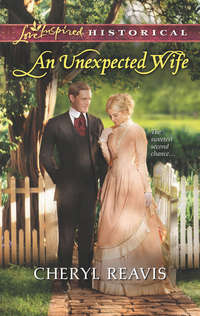
Полная версия
Harrigan's Bride
He gave a quiet sigh. Perhaps Abiah did know. If Guire had been so imprudent as to tell her about their adventures in a New Orleans bordello, there was no telling what else the rascal had taken upon himself to explain. In any event, this bold plan of Abiah’s would certainly give Thomas something to contemplate during the long winter nights to come.
He picked up his pen and immediately put it down again. The ink in the bottle had frozen. His cigar had gone out and his fingers were numb with cold. An abrupt gust of wind caused the smoke from what he optimistically called a fireplace to billow back into the cavernous room. He gave up all pretense of working, the full import of the predicament both he and Abiah were in making a jarring return. He had no patience left. He had to get this marriage done.
“La Broie!”
“Sir!” the sergeant answered almost immediately, his voice echoing in the outer hallway. Thomas suspected that La Broie’s staying so close at hand had less to do with efficiency and devotion and more to do with the fact that Major Gibbons had probably ordered him to do so—in case that wild Captain Harrigan went a-roving again.
“Have you heard anything yet?” Thomas asked when La Broie appeared in the doorway.
“Nothing, sir,” La Broie answered, giving no indication that Thomas had already asked him that same question a dozen times.
“Why is this taking so damn long?” Thomas said, more to himself than to La Broie.
“You know by now how the army works, Cap. It takes as long as it takes.”
Thomas gave La Broie a scathing look. He was not in the mood for any of the sergeant’s military truisms, sage though they may be. He was trying to take care of Abiah. She was ill, and gravely so. The doctors gave him absolutely no encouragement as to her chances for recovery from an illness they couldn’t even diagnose. Typhoid pneumonia, perhaps, they said. The problem was that Abiah had been examined well after the telltale “rose spot” stage indicative of the disease. She had a “continuous fever” to be sure, but no one would—or could—give it a name. The army hospitals were full of “continuous fevers,” which were fatal more times than not.
The best Thomas could do was to make sure Abiah had good nursing care, preferably by someone who understood the dangers of these fever-ridden illnesses. He felt an occasional twinge of guilt that the only person even remotely knowledgeable about these things also happened to be a camp follower. But, like everything else in this situation, he had had no choice but to bow to La Broie’s opinion of Gertie’s willingness and competency, and to hire the girl. So far Thomas hadn’t had cause to regret it—as far as he knew. Gertie seemed happy to have a paying job that didn’t involve throwing her petticoats over her head.
But he had precious little time left before Burnside began his redemptive push toward Richmond, and whatever time Abiah had, Thomas intended it to be as respectable and comfortable as it was in his power to make it. He knew exactly what had to be done, yet not one damn superior officer would tell him anything. How hard could it be to let him leave his quarters long enough to get married?
“La Broie!”
“Sir!”
“I want you to go see how Miss Abiah is this afternoon.”
“Sir—begging your pardon. Wouldn’t it be better for me to see Miss Abiah when I got something to tell her? If I go now and she’s awake, she’s going to ask me things I ain’t got the answers to. If I can’t say for sure you’re going to make it to the ceremony, it’ll just worry her. And she ought not to be worried, sir, I’m thinking. Besides that, she might have gone and changed her mind about marrying you. Maybe you don’t want to give her a chance to retreat before we even get on the field.”
Thomas had to agree, even if he was absolutely convinced now that La Broie had been given unofficial guard duty, and even at the risk of letting him have the last word yet another time. “You’ve got the chaplain ready?”
“Sir, I’ve got three chaplains ready. I’ve got a doctor ready if Gertie needs him—besides the one Miss Abiah’s already got. And I didn’t send off that telegram to your mother,” he added significantly, because, surprisingly, he didn’t approve of Thomas’s having changed his mind about notifying his family. “There ain’t nothing left to do but wait, sir, and that’s the sad truth of it.”
“You’re sure about the arrangements?” Thomas said, looking at the morning muster roll again and trying to get some idea of who was fit for duty—just in case he ever got out of this building and back to soldiering.
“Yes, sir. I’m sure. Zachariah Wilson has been well paid for the room and board—even if he wasn’t using the space nohow. He knows which lawyer will keep on paying him. So Gertie and Miss Abiah can stay right where they are while you and me and the army is gone on this here fool’s errand. Oh, and I been turning people down.”
“What people? For what?”
“People wanting to come to the wedding, sir. We got all manner of volunteers to stand witness for it—from both armies—plus a whole slew of bushwhackers and newspaper people and deserters. You know, it’s kind of hard to tell which is which when you get them all in a bunch. And then there’s some church folk from Falmouth and Fredericksburg trying to get invited. I’m thinking we might need a guard at the door. Miss Abiah ain’t well enough to have a bunch of nosy strangers gawking at her—and you—on account of she’s supposed to be ruined and not long for this world. I did tell all these hopeful guests they could send you and her a wedding present, though.”
Thomas looked up at that impertinence, but La Broie wasn’t in the least discomfited.
“Sir, I ain’t never been one to let opportunity stand around knocking on a shut door,” he said. “And while I’m at it, I reckon I need to be begging your pardon—”
The heavy outer door of the building slammed loudly interrupting whatever La Broie had been about to reveal.
“This is it, Cap,” he said instead. “That’s one of Sumner’s aides coming. The one with all them littlegirl curls.”
“Now how the hell do you know that?” Thomas said, trying to at least appear as if he wasn’t affected by the footsteps echoing briskly down the hall in their direction.
“It’s them prissy little silver spurs he wears. He’s the only one that jingles like that.”
It was indeed the aide-de-camp in question, an overly serious lieutenant, who knocked loudly and who snapped a salute when he was given leave to enter. Thomas was notoriously serious himself—but he chose to leave out the jingling and the posturing.
“Sir!” the aide barked, presenting Thomas with a folded piece of paper and causing La Broie to almost but not quite roll his eyes.
It was a pass, granting one Captain Thomas Harrigan a three-hour furlough in Falmouth. He read it over—twice—and then exhaled quietly in relief.
“No message from General Sumner?” he asked, without looking up.
“No, sir.”
“Then you are dismissed, Lieutenant.”
There was no jingling.
Thomas looked up. “Is there something else?”
“Yes, sir,” the aide said.
“Then what is it?”
“I’m not at liberty to say, sir.”
“Well, I’m not in the mood to guess, I can promise you that—”
The outside door banged loudly again, only this time it sounded as if an entire company were advancing up the hall—singing.
“Sir!” the aide barked. “It is my duty to announce that your groomsmen have arrived!”
* * *
Abiah noted two things when she asked to speak to Thomas alone. That he had gone to a great deal of trouble to look presentable and that he wasn’t entirely sober. She was familiar with the custom of fortifying the groom with whatever strong drink his friends could find prior to the actual ceremony. Hardly any of the weddings she’d ever attended in her whole life had seen the groom not tangle-footed. She just hadn’t considered that this particular wedding would precipitate the ritual and the boisterous male revelry that accompanied it.
She had no illusions about why the marriage was taking place. How could she? Thomas had been nothing if not blunt about his motives. His military career. Her reputation. His obligation to, and his respect for, Guire and the Calder family. But regardless of the circumstances, here Thomas was, and he looked exactly the way a bridegroom was suppose to look. All spit and polish—except for the ink stains on his fingers. He was newly barbered and unsteady on his feet—and infinitely pleased with himself.
“You’re looking lovely this afternoon, Abby,” he assured her.
“You, sir, have had a lot more to drink than I first thought,” she answered.
He smiled one of his rare smiles.
“Only a bit, Abby. To keep away the cold. The boys went to such a lot of trouble to get it. It would have been rude to decline.”
“Is that the real reason?” she asked. “You don’t want to be rude?”
“It is.”
“Rude to them or rude to me?”
“To you?”
“Perhaps you need whiskey to get through this wedding, Thomas. Perhaps you’ve changed your mind but you’re too honorable to say so.”
He frowned. “I have not changed my mind. Have you?”
“Not as far as I can tell,” she said.
He nearly smiled again and pulled the one straight chair close to the bedside and sat down. “So. You recognize me, then.”
“Yes, but it wasn’t easy. You look so much prettier today than when I last saw you.”
He smiled genuinely this time. “I had a great deal of help, I can assure you. I’m especially partial to this very fine maroon-and-gold, nonregulation sash—I forget which of my groomsmen contributed it.” He opened his coat so that she could see it better. “But it’s not as fine as your ribbon,” he said, leaning closer to inspect the pink ribbon Gertie had meticulously twined into Abiah’s long braid and then tied in a dainty bow.
Abiah, too, had had a great deal of help getting ready for this event. Besides the ribbon, her plain muslin nightdress had been exchanged for a finely embroidered and tucked cambric chemise de nuit. It was quite beautiful, albeit too big for her. The sleeves kept falling over her hands. Of course, a pink ribbon and especially the chemise de nuit were hopeless gestures on Gertie’s part, regardless of Thomas’s compliment. Except for the sleeves, he wouldn’t even see the nightdress. Abiah was covered up well past her bosom by a borrowed gray velvet quilt placed under a crocheted “wedding ring” coverlet—something someone in the household—or in the town or across the river—must have thought would be appropriate. Clearly, when the bride was too ill to be dressed, then one must dress the bed instead. Enough pillows had been found so that she could be propped almost to a sitting position. Her beribboned braid hung artfully over her right shoulder. She was even lucid, so much so that she had no delusions about the way she looked, just as she had no delusions about the way she felt.
“Don’t,” he said after a moment, and she looked at him.
“I see the second thoughts running rampant, Abby. I don’t have any. I want you to put yours aside.”
“I’m afraid, Thomas.”
“Not of me, I hope.”
She shook her head. “No, not of you. Of being…” She gave a quiet sigh. It was so difficult to put into words. If she were well, she wouldn’t have all these misgivings. If she were well, she would have at least a fighting chance of keeping him from resenting her and a marriage he’d wanted no part of.
She sighed again. If she were well, there would be no marriage in the first place.
“I’m cursed with a conscience,” she said finally.
“I wouldn’t have you any other way, Abby.”
She realized immediately that he was teasing her. “Thomas, you’re not taking this seriously.”
“Of course I am—”
Someone rapped sharply on the door. “Chaplain’s here, sir!” a voice said on the other side of it.
“We’re worrying La Broie,” Thomas said. “Can we put him out of his misery?”
“He’ll just have to bear up,” she said. “I have a question.”
“It’s very improper for me to be in here, you know. Didn’t you see your landlady’s face when I came in here alone and shut the door?”
“My landlady will have to bear up as well.”
“Abby, we have to have this ceremony right now.”
“But we haven’t discussed…anything.”
“You’re alone in the world and you’re ill. And I’m going into God-knows-what with Burnside. We could discuss all manner of topics until kingdom come, but it would still come down to those two things. We have to concern ourselves with the present situation. Nothing else. We can’t worry about what might come along later.”
“Sir!” La Broie said, rapping at the door again. They both ignored him and the burst of rowdy laughter from Thomas’s groomsmen.
“Have you sent word to her?” she asked Thomas quietly.
He didn’t pretend not to know who she meant. “That wasn’t necessary,” he said after a moment.
“Not even to keep from being rude?”
“No.”
She watched him closely, trying to decide if that was really the case.
Yes, she decided. It wasn’t necessary for him to tell his former fiancée anything. And perhaps that was yet another reason why he wanted this marriage to take place.
“Your mother and grandfather? Do they know what you’re doing?”
“No,” he said again.
“Why not?”
“Because I anticipated this. Your uncertainty. It’s better if they know later, after it’s done.”
“I see. They’d disapprove that much.”
“I don’t know if they would disapprove or not. The point is I don’t have the time or the inclination to hear opinions, one way or the other.”
“You and I have nothing in common,” she said. “Besides the dire consequences of your bringing me across the river—and Guire.”
“I wouldn’t say that. Have you or have you not read Emerson?”
“Only because you insisted.”
“That’s not the point, either. You know his work. We’ve had some most interesting discussions about Emerson. And if I said George Tockner you’d know precisely who I meant.”
She tried to interrupt. The fact that she could recognize the name of a hallowed Harvard professor signified nothing as far as she was concerned. “Thomas—”
“And William Cullen Bryant,” he continued, undeterred. “You’ve read his work.”
“I’ve read Walt Whitman, as well, but I doubt anyone would see that as a basis for a marriage.”
That remark certainly got his attention. “You’ve read Walt Whitman,” he repeated, as if he wanted to make absolutely certain he had this right.
“I have,” she said.
“Leaves of Grass.”
“That was the title, yes. Your Mr. Emerson approved of the work, I believe.”
“Never mind that. How the devil did you get your hands on a copy of Walt Whitman?” he asked—demanded—and she tried not to smile. She found him entirely adorable when he was discomposed.
“Believe me, it wasn’t easy. But that doesn’t matter. What matters is the advisability of this marriage.”
“What matters is that I can see right now it’s going to take all my effort to keep you in hand. Leaves of Grass, indeed.”
“Thomas—”
“My sergeant is going to perish at the door,” he interrupted. “Can we not get on with this and save him—before it’s too late?”
“Can you make me one promise?” she asked.
“What is it?”
“Can you promise not to forget that I gave you the opportunity to escape?”
“And may every other Rebel I meet from here on out do the same,” he said elaborately.
She gave a sharp sigh. “And I was worried about me not being in my right mind.”
He laughed and leaned closer.
“Now, Abby?” he whispered, teasing her again. “Will you give me leave to open the door?”
She didn’t answer him.
“It’s going to be all right,” he said, serious suddenly. “I give you my word on that.”
His word meant a great deal to her. “All right,” she said finally. “Go open the door. Save La Broie and me both.”
Thomas left her to fling the door open. A number of people stood gathered in the hallway and kitchen beyond, most of whom were straining to catch a glimpse inside the room. There would have been a great rush to gain admittance were it not for Sergeant La Broie. He allowed Gertie to enter, and then Mrs. Wilson, the dour lady of the house, who had clearly come out of duty rather than desire. It was the first time Abiah had seen her in person. Heretofore, the woman had only existed in the form of the verbal admonishments constantly repeated by Gertie and the household staff. Mrs. Wilson was full of don’ts. There was no doubt that she ran a tight ship; she was making an inspection even now to see if Abiah and Gertie had done any injury to her domain.
Not one but three army chaplains followed Mrs. Wilson into the room. All three came to stand around the bed. Abiah glanced at Thomas, who winked.
Ah, well, she thought. Given the apparent magnitude of the scandal precipitated by Thomas’s rescue, they had best have the matrimonial knot firmly tied. The chaplains introduced themselves—Brothers, Hearst and Holmes. It was clear that they had already decided among themselves who exactly would do what when. The Reverend Brothers began the proceedings with a lengthy prayer. Abiah was grateful for the opportunity to close her eyes. She was very tired suddenly, and had to concentrate hard not to show it.
Someone knocked on the door. The Reverend Brothers prayed on. Finally, after the third knock, La Broie went to open it, and after a brief, whispered conference with whoever waited on the other side, he accepted an envelope of some sort and closed the door.
The prayer continued. Abiah opened her eyes enough to watch with interest as La Broie discreetly passed the envelope to Thomas, who glanced at it and put it into his pocket.
“If you would join hands, please,” the second chaplain—Hearst—said as soon as the prayer ended. He opened the small leather book he carried and adjusted his spectacles, looking around sharply at another outburst of raucous laughter from out in the hall.
Thomas moved the chair closer to the bed and sat down, so that he could take Abiah’s hand more easily. Hers was trembling, and he looked at her sharply when he realized it.
“I think they would both approve, Abiah,” he said quietly.
“What?”
“Miss Emma,” he said. “And Guire.”
She looked at him a long moment, then nodded.
The Reverend Hearst cleared his throat. “May we continue?”
“Yes,” Thomas said, without looking at him. His eyes still held Abiah’s, and whatever indecision remained suddenly left her.
For better or worse till death do us part, she thought.
The ceremony began in earnest, but it was an obviously shortened version, to accommodate Thomas’s lack of time and her illness. Because of their proximity to the kitchen, Abiah could smell bread baking. She wondered idly if many weddings took place with the aroma of baking bread wafting through. She glanced briefly at the people who stood witness. Gertie, who looked sad enough to cry, and La Broie, who stood ramrod straight next to Gertie and watched her intently. Hardened soldier or not, the man was clearly smitten.
Interesting, Abiah thought. La Broie so enamored, and Gertie so oblivious to it.
Abiah glanced at Mrs. Wilson, with her longsuffering countenance, and made a mental note. Should she and Thomas ever actually live together as man and wife, she would not go around looking like that. She wondered idly if Mr. Wilson was somewhere at hand, too. She hadn’t met him, either, though Gertie had assured her when they first came to the house to stay that she wouldn’t want to.
Abiah turned her attention to the second chaplain.
How determined he is, she thought.
He had offered no call to the ceremony, no “Dearly Beloved…” He had asked for no declaration of consent, no “Wilt thou have this woman…” He had gone straight to the marriage pledge.
Repeat after me.
“I, Thomas, take thee, Abiah…”
Thomas’s voice was strong, unwavering. Whatever happened in the future, she would always remember that he’d said the words with a surety that belied the true situation.
Then it was her turn, and she hesitated too long—long enough to alarm Thomas and everyone else in the room. She abruptly squeezed his hand.
“I, Abiah, take thee, Thomas…”
The last chaplain, Holmes, concluded the ritual with a prayer, and suddenly it was over and done. Abiah immediately looked at Thomas, searching for some indication as to whether or not he was now filled with regret.
But he only smiled and shook everyone’s hand. Then he signed the marriage record and held the book for her to do the same.
“Are you all right, Abby?”
“Tired,” she said, trying to smile. She wanted to say something to Mrs. Wilson, to thank her for her charity and hospitality, but the woman had already opened the door and stepped into the hall. Abiah’s attention was taken then by Sergeant La Broie, who solemnly clasped her hand.
“I’m wishing you health and happiness, ma’am,” he said.
“You’ll watch over Thomas?” she whispered. “Keep him safe?”
“I’ll do my best, Mrs. Harrigan, darling,” he assured her. “I ask the same favor of you. You watch over our Gertie.”
Abiah smiled. The man was completely smitten, she thought again, and she certainly had a profound empathy for anyone in that state. “I will,” she said.
“Pete,” Gertie said. “Don’t let all those people come in here. Miss Abiah needs to rest now.”
He immediately went to stop any uninvited wedding guests from pushing their way inside.
“I forgot, Mrs. Harrigan,” he said, looking over his shoulder. “There’s a wedding present out here for you.”
“A wedding present?”
She looked at Thomas, who was reading the letter La Broie had given him earlier.
“It’s from Johnny Miller,” Thomas said.
La Broie was already bringing the gift in. She recognized it immediately. It was her own cedar hope chest, the one made for her fourteenth birthday by her grandfather Calder. Like most girls that age, she had immediately begun filling it with linens and quilts for that time in the seemingly distant future when she would marry. Seeing it again, when she’d thought everything in the abandoned house had likely been plundered by both armies, brought her close to crying.
“Johnny went to the house and got it,” Thomas said. “Then he bribed a civilian from Fredericksburg to bring it across the river. Put it here, La Broie, where she can see it.”
“How do you know that?” Abiah asked.
“It’s in his letter,” he said, holding up the envelope La Broie had given him. “The letter was for me. The chest, for you.”
“What else does he say?”
“He…wishes us every happiness.”
She smiled. “He was there—the day my grandfather gave the chest to me. And he and Guire teased me so about being an ugly old maid and not needing such a fine piece of furniture. And Mother was…” She stopped and took a quiet breath. She didn’t want to reminisce about the past, even if the past was likely all she would ever have.
The sound of laughter and loud singing burst forth again from the direction of the kitchen.
“I guess more people knew about the wedding than I thought,” she said after a moment.
“I dare say,” he agreed. He was standing so awkwardly, as if he wanted to take his leave, but wasn’t quite sure how to do it.
“I…have a gift for you, too,” he said, and he reached into his pocket—for his watch. He opened it to check the time and then looked at the door.
“If you have to go now, it’s—” she began.
“Sir!” La Broie said abruptly in the doorway, making her jump.
“You must overlook the sergeant, Abby,” Thomas said, taking the bundle La Broie tossed to him. “Believe me, he all too often comes and goes like that.”







